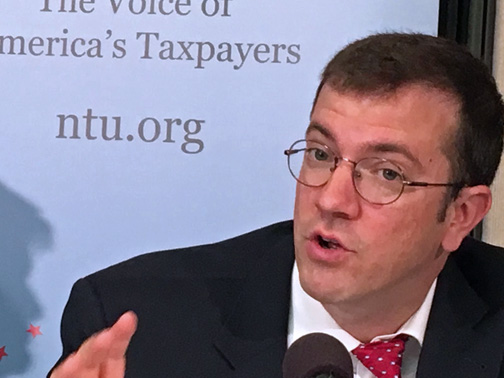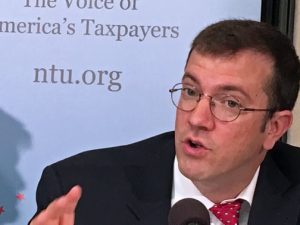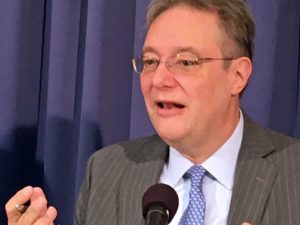Tax experts debate PROMESA’s ‘promise’ at D.C. panel

WASHINGTON — Half a dozen tax attorneys and D.C. policy wonks bickered Tuesday over how to bring Puerto Rico out of its perennial economic crisis in the context of PROMESA, the Puerto Rico Oversight, Management and Economic Stability Act.
The panel, “Keeping the Promise of PROMESA: Next Steps for Puerto Rico,” was organized by the National Taxpayers Union, a conservative, Washington-based citizen group with 362,000 members that calls itself “the voice of America’s taxpayers.”
Warren Payne, a senior advisor at Mayer Brown and former policy director of the House Ways and Means Committee, called PROMESA a “critical first step” towards the orderly restructuring of the commonwealth’s debt.
“But when you look at the primary causes of what’s driving that crisis, it’s wholly — if not mostly — inflicted as a result of actions by Congress in 2006, with the repeal of Section 936,” said Payne, speaking to an audience of about 30 people at Washington’s National Press Club.
“Absent some specific policy, the island is treated as if it’s located in a foreign country. That means those companies can’t bring the money they earn in Puerto Rico back to the U.S. without being subject to a second layer of tax,” he said.
Payne argued that trashing 936 was a mistake.
“There were clearly issues with the administration of 936. However, Congress ultimately threw the baby out with the bathwater. Rather than fix the program, they repealed it entirely. That has created a lockout effect, so there’s a huge disincentive for U.S. companies to invest on the island. Companies rightly ask the question, ‘if I can’t get my money out, why would I invest in Puerto Rico?’”
For this reason, Payne said he supports a restructuring of U.S. tax laws that would account for past federal tax law regarding Puerto Rico while enacting tax treatment that would allow the island to remain competitive with the tax systems of competing markets.
Such a proposal, which Payne said “aims to reward businesses that put real investment on the island,” would ultimately result in 6 percent GDP growth and a 10 percent jump in tax revenues, according to economic analysis that uses methodology consistent with that used by the Congressional Budget Office.
“There would be no revenue lost to the U.S. Treasury, you restore the relationship between the U.S. mainland and Puerto Rico, businesses wouldn’t be treated as if they’re operating in a foreign country, you get real investment, increased wages and you have positive GDP growth. Puerto Rico could then use those tax receipts to pay off its creditors — and the ultimate cost to the U.S. government is zero to minimal.”
John E. Mudd, a San Juan-based attorney and legal analyst, countered that from 1980 to 2006, the year 936 finally disappeared, Puerto Rico averaged less than 2 percent annual growth — so expectations of 6 percent annual growth are unrealistic.
Payne countered that the island has one strong advantage.
“Under 936, Puerto Rico had positive GDP growth,” he said. “We can quibble about whether it’s 2, 3 or 4 percent. But if it’s a positive number, we’ll take it.”
Financial academic J.W. Verret, meanwhile, commended PROMESA, suggesting “95 percent of it was well-crafted and very helpful.” He added that the seven-member Financial Control Board it sets up “has a tremendous amount of promise,” especially thanks to the presence of Andrew Biggs, a resident scholar at the conservative American Enterprise Institute think tank.
Verret, associate professor at the Antonin Scalia Law School and senior scholar at George Mason University’s Mercatus Center, also said application of both the Jones Act and the federal minimum wage to the island “are ultimately cruel to the people of Puerto Rico” because they keep its troubled economy from recovering.
“The Jones Act is nothing but protectionism for the U.S. shipping industry. It significantly increases the cost of goods in Puerto Rico,” he said, noting that the nearby U.S. Virgin Islands is exempt from its provisions, while Puerto Rico is not.
“According to a study by the Federal Reserve Bank of New York, it costs $3,000 to send a 20-foot shipment of household goods to Puerto Rico, and only half that much to send to the Dominican Republic,” said Verret. “Until you change that, you’ll never solve the inherent problems of the Puerto Rican economy.”
Verrett said the privatization of infrastructure should be high up on Puerto Rico’s list of priorities.
“The island needs more fee-based services and toll roads. It also has too many teachers and not nearly enough tax collectors,” he said. “You’ve got to fire 10 to 20 percent of the teaching force and offer them jobs as tax collectors. I would institute that today.”
Verrett offered some other radical suggestions, including appointing a “regulatory czar to make Puerto Rico an easier place to do business,” slashing subsidies to the University of Puerto Rico and urging retirees to take on more part-time employment.
“They’ll live longer and be happier,” he quipped.
Also on the panel was Bill Cooper, staff director on the House Subcommittee on Energy and Mineral Resources; Gordon Gray, director of fiscal policy at the American Action Forum, and Pete Sepp, president of the National Taxpayers Union.













